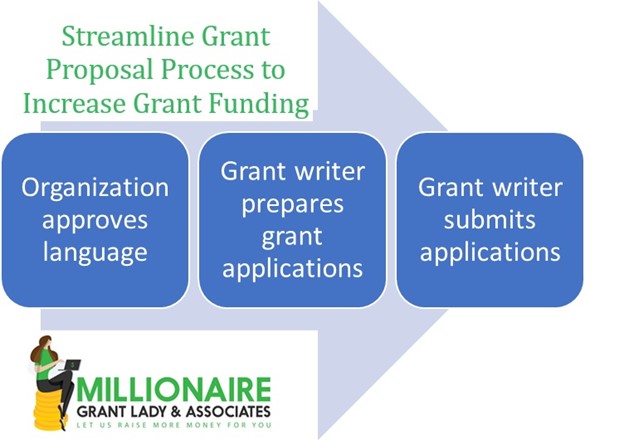It is true that most foundation grant opportunities are highly competitive. Knowing you face a lot of competition may leave you wondering, how do you make your grant application perfect?
Millionaire Grant Lady and Associates has worked with nonprofits of every shape and size all over the United States. We have won funding for organizations to support program expenses, capital campaigns, capacity building, and general operations. And we have seen organizations go to great lengths to create the perfect proposal.
Unfortunately, sometimes, the time and personnel resources organizations invest in foundation proposals are not worth it.
In this article, we are addressing a common mistake many organizations make—spending too much time and too many resources preparing grant applications.
- Common mistake: Organizations who don’t streamline the grant application process.
- Grant money is not free.
- Nonprofits should calculate the time and personnel cost to prepare a grant proposal.
- Make sure you don’t have too many cooks in the kitchen.
- Pro tip: Streamline the grant application process.
- Conclusion
Grant writing mistake: Organizations who don’t streamline the grant application process.
Gratitude is important in the nonprofit and grant writing space. Indeed, I am grateful that foundations exist that give money to nonprofits so they can carry out their important work and impact the lives of people who need it most. I am grateful to partner with so many amazing nonprofits that provide unique, impactful services to many people.
See our article here about the importance of gratitude in grant winning!
But just because a foundation is offering money, that doesn’t mean you should use all your personnel resources and put endless hours into the application.
Grant money is not free.
Often, I hear people say that grants are just free money, like somehow it is lying on a street corner in a duffle bag waiting to get picked up by a lucky nonprofit.
But this is inaccurate.
For a grant application to be successful, a lot of time and effort from many people is required. Even if you use only volunteers, people’s time and expertise have value. To win grants:
- someone will have to prepare the budgets required,
- someone will have to gather and analyze relevant data from your organization,
- someone will have to research the foundations that might give to your organization,
- someone will have to prepare the application,
- someone will have to edit the proposal,
- someone will have to submit the proposal, and
- if you are awarded, someone will have to track new data to report to the funder in a year.
Other foundations might require even more from a nonprofit, such as an in-person meeting, attending their gala, volunteering for their events, or naming rights.
To ensure that winning the grant money is worth it, nonprofits should simplify where they can.
Grant Writing Mistake Solution: Nonprofits should calculate the time and personnel cost to prepare a grant proposal.
Imagine you want to apply to a foundation where the average grant is $5,000. This money is not nothing, and we would be grateful to receive that award. However, we see many nonprofits spend too much time and too many resources on grants of this size.
If a grant writer, the executive director, and a board member all spend time reviewing a grant, each person’s time comes at a price.
Let’s take a look at how submitting applications worked for one nonprofit:
- The organization approved language to use for writing grants
- The grant writer prepared grants
- The program director wanted to review the grant
- The executive director wanted to review the grant
- A board member who used to write grants wanted to review the grant
- The grant came back to the grant writer with conflicting messages from each of the reviewers about changes that needed to be made
- The grant writer attempted to reconcile changes and still meet the space requirements of the grant
- The executive director had further changes
- But wait… the grant deadline is Friday, we need to get this done
- Oh wait… new data just came in that we want to include in the grant
- But wait… one more round of edits please, this has to be perfect!
- The grant was submitted hours before the deadline…. Thank heavens we didn’t run into technical difficulties
In the above scenario, the organization approved language to use for writing the grants which required time and personnel which cost money ($$$), the grant writer worked on the grant at least three separate times ($$$x3), the program director worked on the grant ($$$), the executive director worked on the grant ($$$), a board member worked on the grant ($$$), someone was pulling in new data ($$$), and someone came in at the last minute to edit again ($$$).
That is a lot of wasted resources for a grant with a maximum award of $5,000. Unfortunately, we have seen nonprofits win grants but ultimately lose money because they overspend in having so many people prepare the grant.
Did you know hiring a grant consultant saves clients time and money? To learn more, contact us today.
Grant Writing Mistake Solution: Make sure you don’t have too many cooks in the kitchen.
Also, this scenario leads to there being too many cooks in the kitchen. Each of the reviewers had different, often conflicting feedback about the writing. How is the grant writer supposed to accommodate so many different pieces of feedback?
Additionally, each of these steps took a lot of time and led to the grant being submitted just hours before it was due, which is not ideal. Applications should be submitted well ahead of the posted deadline whenever possible. When grants are submitted right at the deadline, any slight problem could lead to you not getting the grant submitted—internet outages, anyone?
Grant Writing Mistake Solution: Streamline the grant application process.
We recommend using the following process to help streamline the grant application process:
- As an organization, develop approved language to use when submitting grants.
- The grant writer uses this approved language to prepare all grant applications.
- The grant writer submits all grant applications.
This streamlines the application process because the organization only has to review and approve the original language, which is then used to create all grant applications. The grant writer then uses that information to send the same information to all funders.
Conclusion:
We understand that organizations care deeply about how their work is portrayed to potential partners. This is why it is important that they approve the language used for all grant applications.
By approving this language at the beginning of the grant application process, the organization can streamline this process because they review language just once. Then, the grant writer uses this approved language for each application. This process simplifies the application drafting, editing, and submission process. Ultimately, this will help you get more applications out the door more quickly with fewer errors, which increases the chance that you will receive the funding you seek.
Are you looking for an expert to partner with you in this work? We are here to help. Contact us today.




